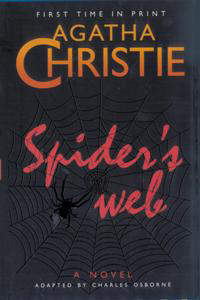Charles Osborne (1927-2017) wraps up his trilogy of Agatha Christie play novelizations with “Spider’s Web” (2000), based on her 1954 play. It’s another tasty snack of a pseudo-novel; I polished it off in two days. Although it is aptly titled due to the tangled web of strategies Clarissa employs to hide a dead body, it’s easy to follow and it’s fun to theorize whodunit.
As with “Black Coffee” and “The Unexpected Guest,” 95 percent of the action takes place in a living room of an English country house. It might as well be the same room as in those other stories. People sneak in and out through French windows, and the police use the room for interviewing witnesses. It also has a secret passageway into the library, with one of those “Scooby Doo”-style revolving bookshelves.
Clarissa explains away a murder
The play’s rompish entertainment value would hinge on the casting of Clarissa, who is attractive to men (especially houseguest Jeremy, who would like to steal Clarissa away from her dreary husband) but who has a tendency to lie. In fact, when she tells the truth, people assume she is lying. Talk about an unreliable narrator.

“Spider’s Web” (2000)
Author: Charles Osborne, novelizing Agatha Christie’s 1954 stage play
Genre: Mystery
Setting: English country house, 1954
The men – three houseguests plus Clarissa’s husband and a butler – aren’t as crisply drawn; they are simply Christie staples. The butler, nervous about his employment when the police come knocking, could be from any of her stories. But the interplay is brisk and engaging, especially when Clarissa calls upon the three houseguests to help her hide the body she has literally stumbled over. We get some entertaining moral haranguing even as the timing becomes urgent.
A hefty female gardener and Clarissa’s young stepdaughter also provide entertainment and potential outside-the-box suspects. Christie goes edgier than usual by making the murder victim, the new husband of Clarissa’s husband’s ex-wife, evil in a way that’s unusual for her stories – he is apparently a child molester.
When Clarissa’s husband – a government official – explains his plans to bring a Russian diplomat to the house for a secret meeting, the web could become even more tangled. Heck, this could become an all-out farce in the final act. But then Christie pulls back on that strand, and the ending – although satisfying and believable – isn’t as wild as “Black Coffee” or as “gotcha” as “The Unexpected Guest.”
Although a fun page-turner, “Spider’s Web” isn’t different enough to stand out, especially if you’ve read the first two Osbornes. Still, I’m glad we have these novelizations.
Opportunities for more novelizations
In fact, it’s too bad Osborne didn’t novelize more Christie plays before his death in 2017. As I noted in my other reviews, these aren’t as “good” as Christie’s own novels, since Osborne purposely doesn’t add literary embellishments. But – assuming that most Christie fans would rather read something in novel form than stage play form — they are the next-best thing to going to the play itself, which is generally not an option.

Christie wrote five additional stage plays that have no novel or short-story counterpart (although some have been published in play format). They are “Verdict” (1958), “Rule of Three” (1963, which includes three one-act plays), “Fiddlers Three” (1971), “Akhnaton” (1973, set in ancient Egypt) and the recently uncovered “The Lie” (2018).
Additionally, there are the radio plays “Butter in a Lordly Dish” (1948) and “Personal Call” (1954, featuring “The Sittaford Mystery’s” Inspector Narracott).
No doubt these plays aren’t as ripe for novelization as the three that were chosen. But they could get by on curiosity value, if nothing else. Christie’s publishers should consider hiring an author to novelize these remaining plays.
Sleuthing Sunday reviews an Agatha Christie book or adaptation. Click here to visit our Agatha Christie Zone.

